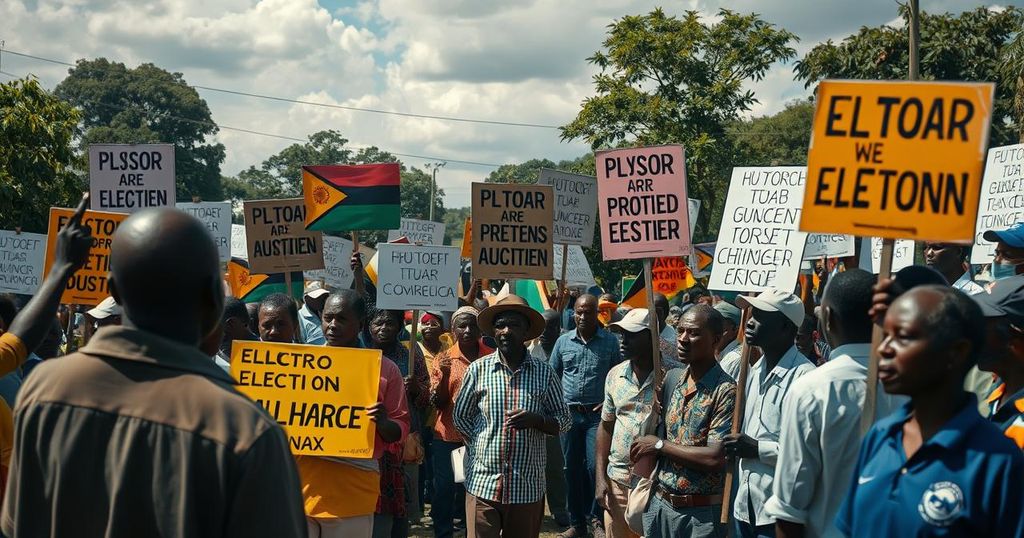The recent elections in Mozambique indicate a likely win for FRELIMO and Daniel Chapo, amid claims of electoral fraud by opposition candidate Venancio Mondlane. Allegations include organized chaos at polling stations, disenfranchisement of voters, and unauthorized voting participation by foreign citizens, primarily from Zimbabwe. Calls for independent investigations into the electoral process emerge, reflecting concerns about the integrity of the election outcomes and the fate of opposition parties.
The political climate in Mozambique is tumultuous following the recent election results, which seemingly favor the ruling party, the Liberation Front of Mozambique (FRELIMO), and its candidate, Daniel Chapo. As the official results are yet to be finalized, there are severe allegations of electoral fraud presented by the opposition, notably Venancio Mondlane, an independent presidential candidate who asserts that he has been subjected to significant electoral manipulation. He stated, “What we are seeing here is election rigging of the highest order,” implying that fraudulent activities have been a recurrent theme in prior elections. Official counts indicate that Daniel Chapo had the majority in Maputo, securing 53.68% of the votes, while Mondlane followed with 33.84%. Nevertheless, Chapo’s win becomes controversial as Mondlane and his supporters claim widespread electoral fraud. Observers noted that the primary opposition party, Renamo, is facing a potential decline in status, as journalist Jaime Guiliche stated, “I think we will see a situation where Renamo is no longer the second-largest political force and will fall to third place.” Allegations of fraudulent practices were also reinforced by Renamo’s candidate for governor in Zambezia, Manuel de Araujo, who purported that electoral authorities were unprepared, leading to organized chaos at polling stations. He noted that many voters were unable to cast their ballots due to unjust removals from voter rolls. Furthermore, instances of deliberate power supply disruptions hindered the vote counting process, as exemplified by Araujo’s observations in Quelimane, which highlighted pre-filled ballots favoring FRELIMO. Claims extended to irregular voting processes abroad, particularly in Zimbabwe, where reports suggest that unregistered Zimbabwean citizens participated in Mozambique’s elections, allegedly instigated by Zimbabwe’s ruling Zanu-PF party. This has raised further questions about the legitimacy of the electoral process in Mozambique, to which Zanu-PF’s involvement has reportedly been documented in various local media sources. There is a growing call for independent investigations to ascertain the legitimacy of the recent elections, as numerous parties question the transparency and integrity of the electoral process, demanding thorough scrutiny to uphold democratic principles in Mozambique.
The ongoing political tensions in Mozambique are deeply rooted in decades of historical conflict and authoritarian rule since its independence. FRELIMO has maintained its power through multiple electoral cycles, often amidst contestations and accusations from opposition parties. The current elections have revealed fractures in the political landscape, especially as the primary opposition party, Renamo, faces declining influence. Additionally, the involvement of foreign entities in domestic elections raises concerns regarding electoral integrity and the practice of democracy in Mozambique.
In conclusion, the recent elections in Mozambique have been marred by serious allegations of electoral fraud and irregularities. The opposition’s claims of vote manipulation and disenfranchisement of voters highlight significant issues with the electoral process, casting doubt on the legitimacy of the ruling party’s victory. Calls for independent investigations reflect a broader apprehension about the health of democracy in Mozambique, particularly in light of potential illegal voting practices involving foreign citizens. The future political landscape may shift dramatically if Renamo’s status continues to erode as suggested by analysts.
Original Source: www.dw.com






